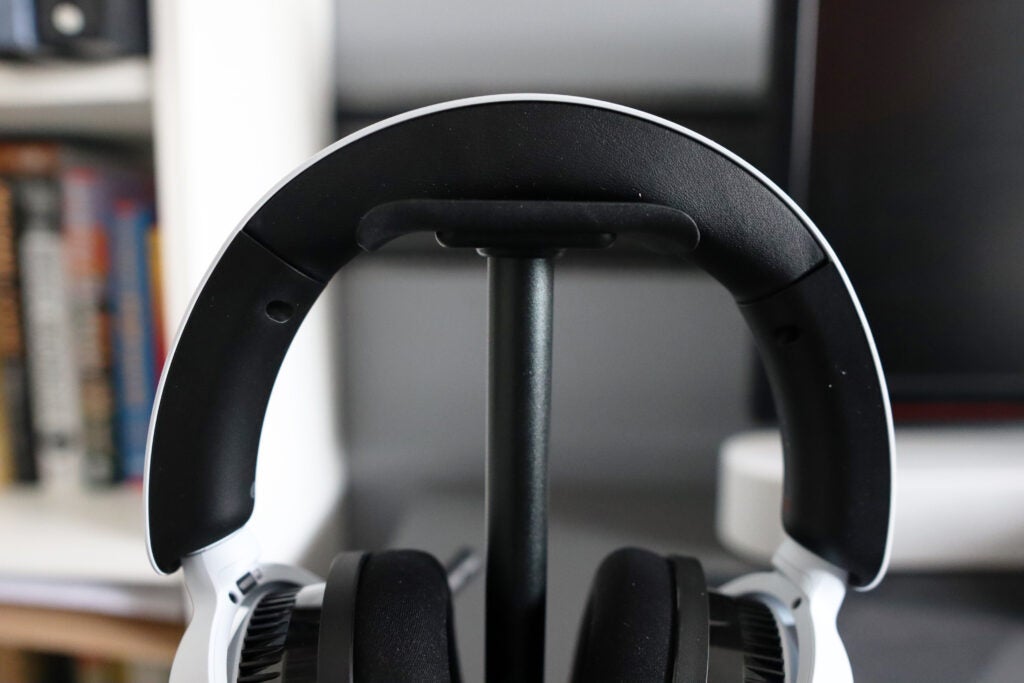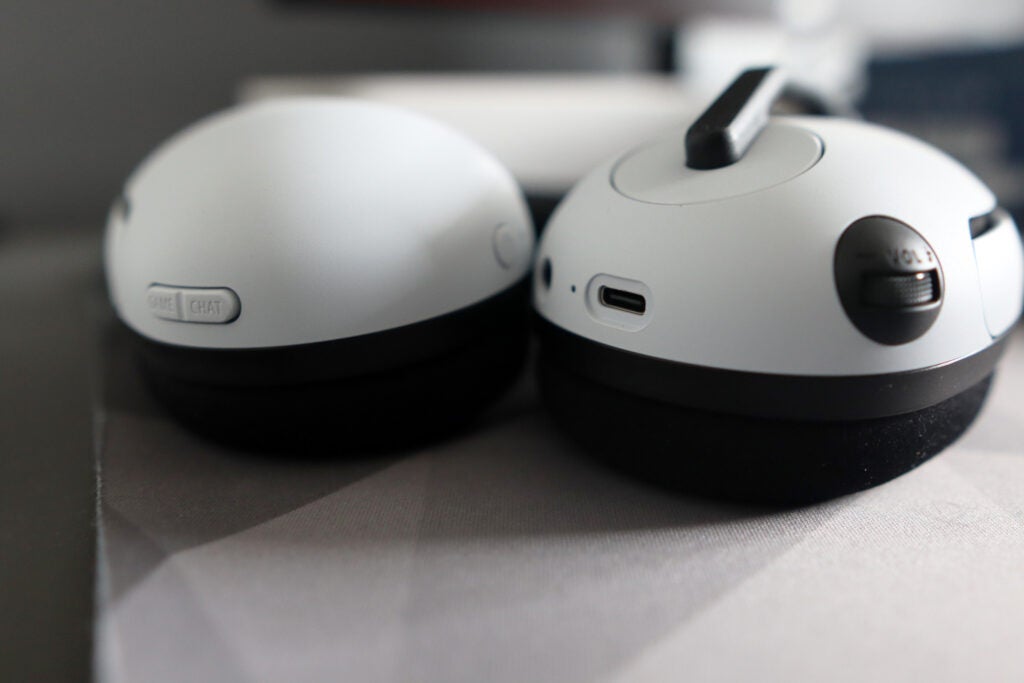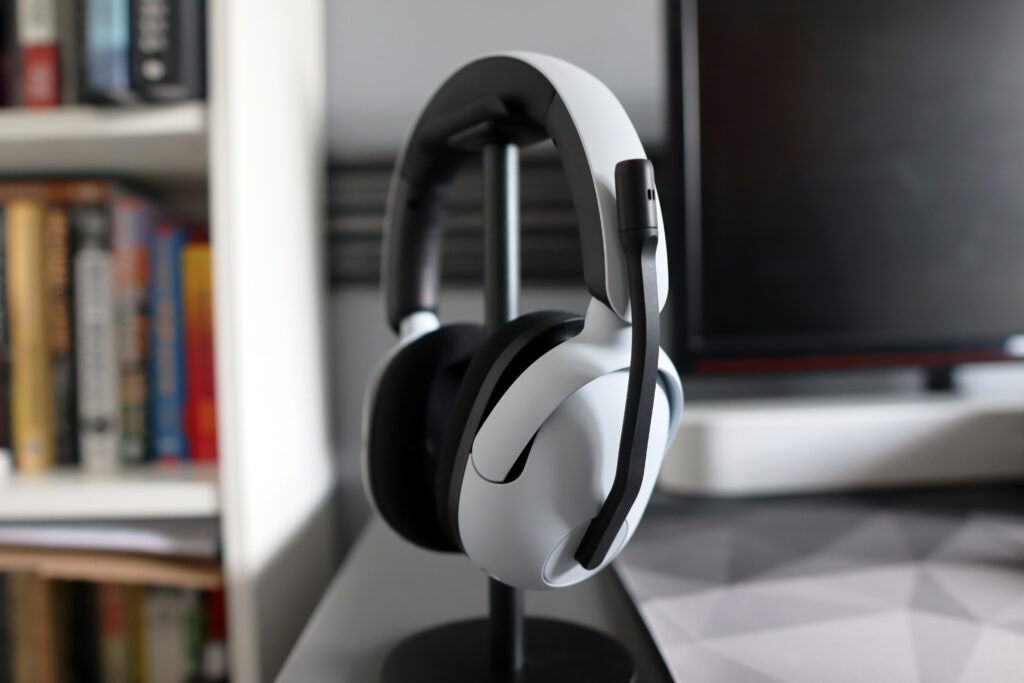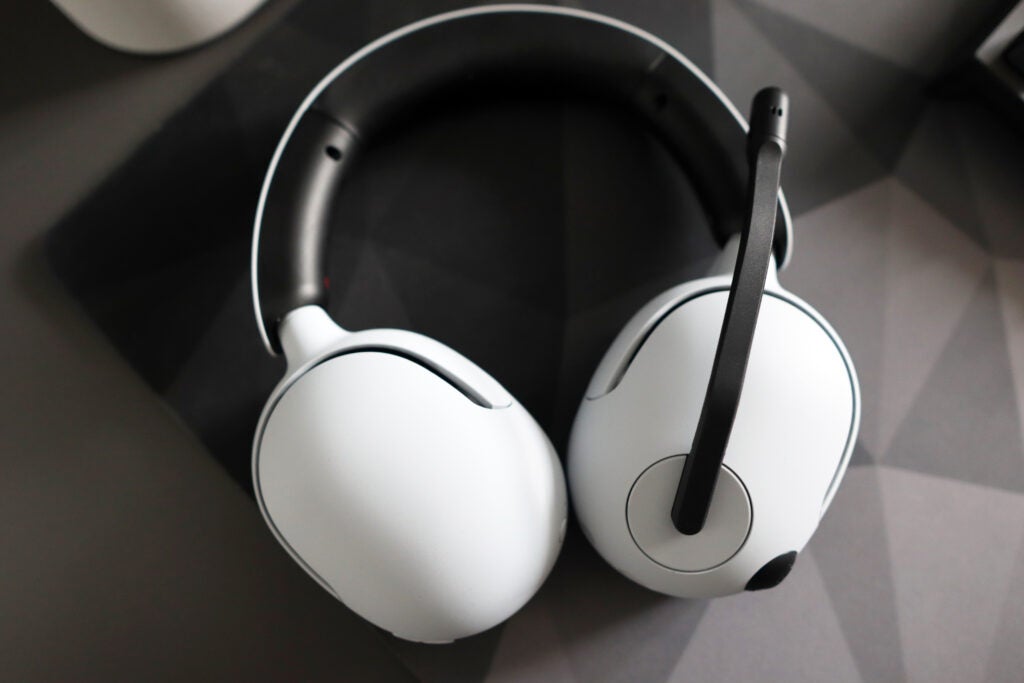Verdict
The Sony Inzone H5 is a decent gaming headset. It’s comfortable, sleek and provides solid audio. That sound is precise and wide, with Spatial Audio enabled. Battery life and connectivity are good, while its microphone offers okay body for the price. There are better overall options, but the Inzone H5 is a serviceable pick.
Pros
- Modern, good looks
- Convenient connectivity
- Great battery life
Cons
- Tighter clamping force
- Narrower soundstage without Spatial Audio
Introduction
Out of the last 18 months or so, one of the more interesting peripherals releases has been Sony’s run of Inzone PS5 and PC headsets. The latest of these is the Inzone H5, which fits in just above the wired H3 and much below the dearer H7, and H9.
Priced at £140/€150, it puts them firmly in the mix against the likes of the SteelSeries Arctis Nova 7 Wireless and the HyperX Cloud Alpha Wireless, and has a lot to live up to, based on Sony’s previous efforts.
I’ve been testing Sony’s latest over-ear gaming headset to find out whether it makes for one of the best PS5 headsets available – let’s have a gander.
Design and Features
- Comfortable fit with fabric padding
- Sleek white chassis matches well with PS5
- Good connectivity and battery life
The Inzone H5 carries similar looks to the other headsets within Sony’s lineup with a sleek white plastic outer casing and black fabric adorning the earcups and headband. It’s a sleek-looking headset that matches well with the PS5 and appears less bulky than their more expensive counterparts with a slimmer profile.
There are some differences between the higher-priced H7 and this when you get your hands on them, though. The H7 opts to go for clicky adjustment on the headband, while the H5’s is smooth. At 260g, they are also noticeably lighter, but their construction doesn’t feel any cheaper, which is a massive plus.
The decision to keep the fabric padding from the H7 is an inspired one, given it allows for the H5s to feel comfortable when on your head. Despite the tighter clamping force, the lower weight makes them a comfortable wear, while the fabric padding feels plusher than the more common leatherette. It’s springy around the headband but definitely feels supportive.

By comparison to the deeper earcups on the more expensive Inzone models, the H5’s feel quite shallow compared to what I’m used to. Your ears feel as if they are right up against the drivers as opposed to offering a sense of breathing room. To alleviate this, proper adjustment and fitting are required, and the lack of any stepped headband adjustment can make this a little tricky.
On the plus side, however, the H5’s passive noise isolation is fantastic, especially considering the price. It blocks out a good proportion of noise, whether it’s music from the next room, or annoying sawing noises from other houses around me.
Multimedia controls are kept few and far between, but for the ones that are present, the H5 keeps it simple with dedicated tactile buttons, as opposed to touch controls or multi-function buttons or dials. The left-hand side is home to a volume wheel, a USB-C port for charging, and a 3.5mm headphone jack, while the right-hand side houses a power button and game and chat volume controller.

As for the packaging, Sony makes the claim that it’s plastic-free, and the black cardboard boxes used to house both the Inzone H5 and the additional components, including its receiver, exemplify this well.
It’s on the front of compatibility where the first difference between the Inzone H5 and its superiors emerges. There isn’t any Bluetooth connectivity here, and the H5 works via the bundled USB-A receiver only with either PC or PS5. To change over, you just need to switch the receiver to the dedicated label. It’s plug-and-play and worked without a hitch on my PC. The addition of a 3.5mm jack also allows for wired operation, which is a huge plus.
The battery life here isn’t as good as the H7, but a total of 28 hours is still on par with a lot of more expensive headsets, too. In testing, the H5 matched Sony’s claims, while it’s also handy that if you’re caught short, a quick 10-minute charge can give you 3 hours of go-juice and get you back in the game.

The accompanying Inzone Hub software provides some interesting options with preset EQs for games and music, as well as an adjustment to change the dynamic range of the headset, and adjust the microphone volume and sidetone. You can also manually adjust the game/chat balance of the headset’s output, too.
It’s presented cleanly and is easy to use with all functions in one tab. The fact the interface’s features are quite spaced out across the window means it looks like it isn’t as packed with features as other suites from the competition, though.
Audio and Microphone
- Spatial Audio works wonders
- Smooth sound, although lacks a certain low-end punch
- Decent body to the microphone, and blocks out ambient noise well
As for their sound quality, the Inzone H5’s feel quite closed in, with not much in the way of soundstage. In testing with the likes of Earth Wind and Fire’s September for instance, there wasn’t the expansive sound I’d come to expect from Sony’s headsets. With this in mind, however, going through the process of enabling the Spatial Audio settings within the associated Inzone Hub brought the best out of the H5s, with a wider and more precise sound.
Their mid-range is clear, although the lower end lacks a certain punch in bassy tracks, such as Rush’s YYZ. A listen to Steely Dan’s Do it Again proved the top end to be crisp with the track’s percussion coming across well, although it proved again the lack of bottom end. It’s there but doesn’t feel like there’s much presence on the default EQ setting.

The addition of Spatial Audio certainly makes a large difference in how the Inzone H5’s sound, and this certainly became true in testing when running through Sniper Elite V and CS:GO. It provides a much better sense of immersion and placement and makes enemies easier to listen out for.
The Inzone H5’s microphone is a flip-to-mute option, which does away with the need for a physical mute button, and there’s a pleasing click when moving it into place to tell you that it’s muted or unmuted. As for its sound, much like Sony’s other efforts, there’s a decent body and it’s perfectly adequate for in-game comms. It also does a solid job of blocking out a lot of ambient noise thanks to its AI noise cancellation – the same tech is also featured on Sony’s Inzone Buds.
Latest deals
Should you buy it?
You want stylish, modern looks:
The Inzone H5 really impresses with its modern, PS5-inspired looks and will integrate well if you’re looking for a matching solution.
You want especially spacious audio:
While the audio that the Inzone H5 offers isn’t bad, it isn’t the widest, unless you enable its Spatial Audio. Competitors such as the Corsair HS80 Max Wireless offer a wider soundstage and generally better audio for not much more in price.
Final Thoughts
Sony’s Inzone H5 fits a gap within the brand’s Inzone lineup of headsets that perhaps seems a little odd, taking a step back and looking at current market prices. The H7 is available from a multitude of retailers for around the same price, and with it, you get Bluetooth connectivity, deeper earcups, and a better battery life. Even then, compared to Sony’s own price of £169, it’s worth the extra money.
It looks good with a sleek white finish, is lightweight at 260g, and the fabric padding feels great around my head. I just wish the earcups were a little deeper, which could also help the issue of a narrower soundstage than the competition. The audio on offer is generally good with a smooth sound that deals with the mid-range and top-end well. The bottom end doesn’t have quite as much thump as other headsets traditionally do, and I was left wanting a little more bite. Turning on the Spatial Audio that Sony provides in their decent software improved things to no end.
To be fair to Sony, there is some stiff competition in and around the price mark it’s hitting, and it isn’t just their own H7. The Corsair HS80 Max Wireless is a generally better headset with more rich and detailed audio, combined with a similar aesthetic, and was at a lower price during the recent Prime Day sales than the H5, while the HyperX Cloud Alpha Wireless opts for a more industrial aesthetic and offers a better battery life by tenfold.
How we test
We use every headset we test for at least a week. During that time, we’ll check it for ease of use and put it through its paces by using it in a variety of games, as well as playing music in order to get the full experience.
We also check each headset’s software (if applicable) to see how easy it is to customise and set up.
FAQs
No. The Inzone H5 works solely over the included 2.4GHz receiver, but is compatible with both PS5 and PC.
Sony rates the Inzone H5 to last for up to 28 hours on a single charge.
Verdict
The Sony Inzone H5 is a decent gaming headset. It’s comfortable, sleek and provides solid audio. That sound is precise and wide, with Spatial Audio enabled. Battery life and connectivity are good, while its microphone offers okay body for the price. There are better overall options, but the Inzone H5 is a serviceable pick.
Pros
- Modern, good looks
- Convenient connectivity
- Great battery life
Cons
- Tighter clamping force
- Narrower soundstage without Spatial Audio
Introduction
Out of the last 18 months or so, one of the more interesting peripherals releases has been Sony’s run of Inzone PS5 and PC headsets. The latest of these is the Inzone H5, which fits in just above the wired H3 and much below the dearer H7, and H9.
Priced at £140/€150, it puts them firmly in the mix against the likes of the SteelSeries Arctis Nova 7 Wireless and the HyperX Cloud Alpha Wireless, and has a lot to live up to, based on Sony’s previous efforts.
I’ve been testing Sony’s latest over-ear gaming headset to find out whether it makes for one of the best PS5 headsets available – let’s have a gander.
Design and Features
- Comfortable fit with fabric padding
- Sleek white chassis matches well with PS5
- Good connectivity and battery life
The Inzone H5 carries similar looks to the other headsets within Sony’s lineup with a sleek white plastic outer casing and black fabric adorning the earcups and headband. It’s a sleek-looking headset that matches well with the PS5 and appears less bulky than their more expensive counterparts with a slimmer profile.
There are some differences between the higher-priced H7 and this when you get your hands on them, though. The H7 opts to go for clicky adjustment on the headband, while the H5’s is smooth. At 260g, they are also noticeably lighter, but their construction doesn’t feel any cheaper, which is a massive plus.
The decision to keep the fabric padding from the H7 is an inspired one, given it allows for the H5s to feel comfortable when on your head. Despite the tighter clamping force, the lower weight makes them a comfortable wear, while the fabric padding feels plusher than the more common leatherette. It’s springy around the headband but definitely feels supportive.

By comparison to the deeper earcups on the more expensive Inzone models, the H5’s feel quite shallow compared to what I’m used to. Your ears feel as if they are right up against the drivers as opposed to offering a sense of breathing room. To alleviate this, proper adjustment and fitting are required, and the lack of any stepped headband adjustment can make this a little tricky.
On the plus side, however, the H5’s passive noise isolation is fantastic, especially considering the price. It blocks out a good proportion of noise, whether it’s music from the next room, or annoying sawing noises from other houses around me.
Multimedia controls are kept few and far between, but for the ones that are present, the H5 keeps it simple with dedicated tactile buttons, as opposed to touch controls or multi-function buttons or dials. The left-hand side is home to a volume wheel, a USB-C port for charging, and a 3.5mm headphone jack, while the right-hand side houses a power button and game and chat volume controller.

As for the packaging, Sony makes the claim that it’s plastic-free, and the black cardboard boxes used to house both the Inzone H5 and the additional components, including its receiver, exemplify this well.
It’s on the front of compatibility where the first difference between the Inzone H5 and its superiors emerges. There isn’t any Bluetooth connectivity here, and the H5 works via the bundled USB-A receiver only with either PC or PS5. To change over, you just need to switch the receiver to the dedicated label. It’s plug-and-play and worked without a hitch on my PC. The addition of a 3.5mm jack also allows for wired operation, which is a huge plus.
The battery life here isn’t as good as the H7, but a total of 28 hours is still on par with a lot of more expensive headsets, too. In testing, the H5 matched Sony’s claims, while it’s also handy that if you’re caught short, a quick 10-minute charge can give you 3 hours of go-juice and get you back in the game.

The accompanying Inzone Hub software provides some interesting options with preset EQs for games and music, as well as an adjustment to change the dynamic range of the headset, and adjust the microphone volume and sidetone. You can also manually adjust the game/chat balance of the headset’s output, too.
It’s presented cleanly and is easy to use with all functions in one tab. The fact the interface’s features are quite spaced out across the window means it looks like it isn’t as packed with features as other suites from the competition, though.
Audio and Microphone
- Spatial Audio works wonders
- Smooth sound, although lacks a certain low-end punch
- Decent body to the microphone, and blocks out ambient noise well
As for their sound quality, the Inzone H5’s feel quite closed in, with not much in the way of soundstage. In testing with the likes of Earth Wind and Fire’s September for instance, there wasn’t the expansive sound I’d come to expect from Sony’s headsets. With this in mind, however, going through the process of enabling the Spatial Audio settings within the associated Inzone Hub brought the best out of the H5s, with a wider and more precise sound.
Their mid-range is clear, although the lower end lacks a certain punch in bassy tracks, such as Rush’s YYZ. A listen to Steely Dan’s Do it Again proved the top end to be crisp with the track’s percussion coming across well, although it proved again the lack of bottom end. It’s there but doesn’t feel like there’s much presence on the default EQ setting.

The addition of Spatial Audio certainly makes a large difference in how the Inzone H5’s sound, and this certainly became true in testing when running through Sniper Elite V and CS:GO. It provides a much better sense of immersion and placement and makes enemies easier to listen out for.
The Inzone H5’s microphone is a flip-to-mute option, which does away with the need for a physical mute button, and there’s a pleasing click when moving it into place to tell you that it’s muted or unmuted. As for its sound, much like Sony’s other efforts, there’s a decent body and it’s perfectly adequate for in-game comms. It also does a solid job of blocking out a lot of ambient noise thanks to its AI noise cancellation – the same tech is also featured on Sony’s Inzone Buds.
Latest deals
Should you buy it?
You want stylish, modern looks:
The Inzone H5 really impresses with its modern, PS5-inspired looks and will integrate well if you’re looking for a matching solution.
You want especially spacious audio:
While the audio that the Inzone H5 offers isn’t bad, it isn’t the widest, unless you enable its Spatial Audio. Competitors such as the Corsair HS80 Max Wireless offer a wider soundstage and generally better audio for not much more in price.
Final Thoughts
Sony’s Inzone H5 fits a gap within the brand’s Inzone lineup of headsets that perhaps seems a little odd, taking a step back and looking at current market prices. The H7 is available from a multitude of retailers for around the same price, and with it, you get Bluetooth connectivity, deeper earcups, and a better battery life. Even then, compared to Sony’s own price of £169, it’s worth the extra money.
It looks good with a sleek white finish, is lightweight at 260g, and the fabric padding feels great around my head. I just wish the earcups were a little deeper, which could also help the issue of a narrower soundstage than the competition. The audio on offer is generally good with a smooth sound that deals with the mid-range and top-end well. The bottom end doesn’t have quite as much thump as other headsets traditionally do, and I was left wanting a little more bite. Turning on the Spatial Audio that Sony provides in their decent software improved things to no end.
To be fair to Sony, there is some stiff competition in and around the price mark it’s hitting, and it isn’t just their own H7. The Corsair HS80 Max Wireless is a generally better headset with more rich and detailed audio, combined with a similar aesthetic, and was at a lower price during the recent Prime Day sales than the H5, while the HyperX Cloud Alpha Wireless opts for a more industrial aesthetic and offers a better battery life by tenfold.
How we test
We use every headset we test for at least a week. During that time, we’ll check it for ease of use and put it through its paces by using it in a variety of games, as well as playing music in order to get the full experience.
We also check each headset’s software (if applicable) to see how easy it is to customise and set up.
FAQs
No. The Inzone H5 works solely over the included 2.4GHz receiver, but is compatible with both PS5 and PC.
Sony rates the Inzone H5 to last for up to 28 hours on a single charge.

























